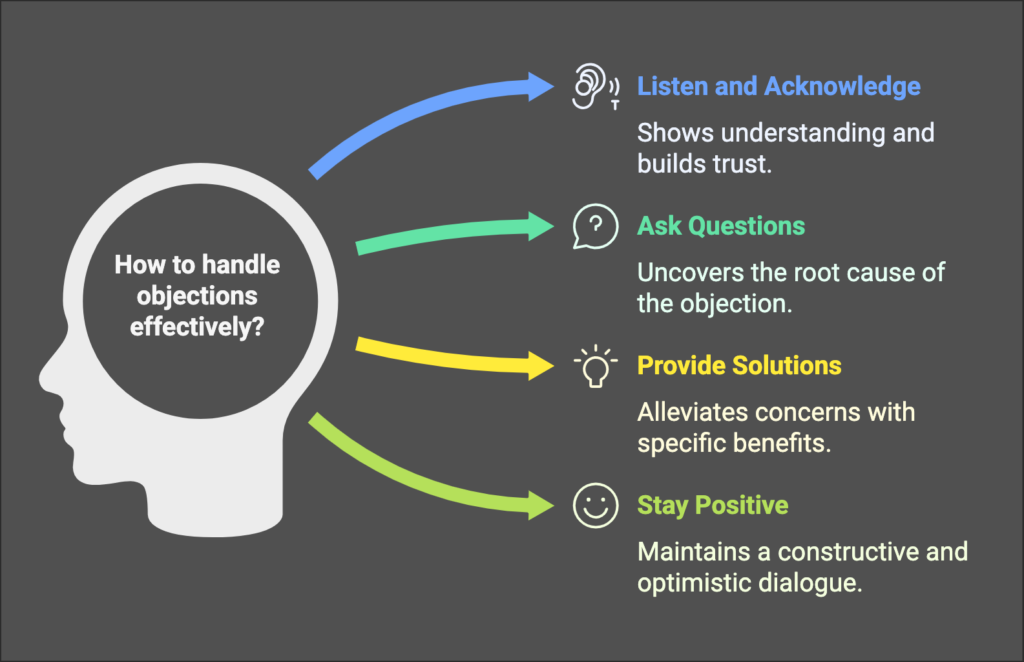
Making consistent sales as a beginner can feel daunting. The uncertainty of where to start, the fear of rejection, and the pressure to succeed can all seem overwhelming. But the truth is, every successful salesperson was once a beginner too.
The key to overcoming these challenges lies in adopting the right mindset and implementing effective strategies. With preparation, persistence, and a willingness to learn, you can build the confidence and skills needed to close your first deal.
This guide will provide practical, actionable tips designed specifically for beginners. From understanding your product to mastering communication and handling objections, these steps will set you on the path to achieving sales success and help you make consistent sales even as a beginner. Are you ready?
1. Understand Your Product Inside and Out
When you’re starting out in sales, one of the most powerful tools at your disposal is a deep understanding of the product or service you’re offering. No one achieves making sales consistently without having a deep knowledge about the product being sold Having thorough product knowledge isn’t just helpful—it’s essential. The more you know, the more effectively you can communicate its value to your prospects, which builds both your confidence and credibility.
The importance of product knowledge:
A strong command of your product enables you to answer questions, address objections, and guide your prospects to a purchase decision with ease. When a customer senses your expertise, they’re more likely to trust your recommendations and view you as a reliable source.
Key areas to focus on:
- Features: Understand the technical aspects of your product—what it does, how it works, and its core functionalities.
- Benefits: Go beyond the features and think about the direct benefits your product provides to the customer. How does it make their life easier, more efficient, or more enjoyable?
- Problem-solving capabilities: Identify the problems your product solves. Whether it’s saving time, increasing productivity, or reducing costs, being able to link your product to specific customer needs will make it far more compelling.
When you’re able to articulate how your product works and why it’s the best solution for your prospect’s needs, you exude confidence. This confidence not only reassures your customers but also positions you as an expert in their eyes. The more you master your product, the more natural and persuasive your sales pitch will become. Thereby, ensuring that you make consistent sale even as a Beginner.
In short, understanding your product inside and out is the foundation of every successful sale. It enables you to communicate value effectively, handle objections, and ultimately close the deal. The better you know your product, the better you can help your prospects make an informed, confident decision.
2. Identify Your Target Audience
Knowing your audience is critical to sales success. Without a clear understanding of who your ideal customer is, you risk wasting time and resources on the wrong prospects. When you know your audience, you can craft tailored messages that resonate with their needs and position yourself as the solution they’ve been searching for.
Here’s how to research your target market:
- Identify Pain Points: Understand the problems your audience is facing. What challenges do they need help overcoming?
- Explore Demographics: Gather data about their age, location, income, occupation, and other relevant factors.
- Assess Needs: Dig deeper into what they truly want. How can your product or service meet these needs in a way that others cannot?
Once you’ve gathered this information, use it to tailor your messaging. Speak directly to your audience’s pain points and aspirations, showing them how your product can make their lives better. Personalised messaging demonstrates that you understand their needs, making them more likely to trust and engage with you. To make consistent sales as a beginner, you must be ready to do the hard work of knowing your audience inside out.
3. Develop a Unique Selling Proposition (USP)
A Unique Selling Proposition (USP) is what sets you apart from the competition and helps you make consistent sales as a beginner. It’s the defining element that tells your audience why they should choose your product or service over anyone else’s. A strong USP highlights the unique value you bring to the table and gives potential customers a compelling reason to buy.
Here’s how to identify and develop your USP:
- Analyse Competitors: Look at what your competitors are offering and find gaps in their approach. What do they lack that you can provide?
- Focus on Benefits: Identify the key benefits your product delivers. Think about how it solves a problem or enhances your customers’ lives.
- Keep It Simple: Craft a clear, concise statement that communicates your USP in one or two sentences.

Examples of compelling USPs:
- “Fresh meals delivered to your door in 30 minutes or less – guaranteed!”
- “Our skincare products are 100% organic and specifically designed for sensitive skin.”
- “Get personalised marketing strategies that double your sales – or your money back!”
Your USP should align with your target audience’s needs and clearly differentiate you from the competition. When communicated effectively, it becomes a powerful tool for capturing attention and driving sales.
4. Master Effective Communication
Strong communication skills are the backbone of successful sales, especially for beginners looking to make consistent sales. How you connect with prospects can make the difference between closing a deal and losing a potential customer. Effective communication helps build trust, uncover customer needs, and position you as a reliable problem-solver.
Here are the key elements of mastering communication:
- Active Listening: Pay close attention to what your prospects are saying. Show genuine interest, ask clarifying questions, and avoid interrupting. This demonstrates that you value their input and are focused on addressing their concerns.
- Building Rapport: Establishing a personal connection with your prospects creates trust and makes the sales process more enjoyable for both parties. Find common ground, show empathy, and maintain a friendly yet professional tone.
- Asking Open-Ended Questions: Move beyond “yes” or “no” questions. Use open-ended questions to encourage your prospects to share more about their needs, challenges, and goals. For example:
- “What challenges are you currently facing with [specific problem]?”
- “What are you hoping to achieve with [product or service]?”
By mastering these skills, you’ll create meaningful conversations that help you make consistent sales as a beginner, leading to deeper understanding and stronger relationships with your prospects.
Also Check: 7 Simplе Ways to Do Markеting Yoursеlf That Works in Scotland
5. Learn and Practice Sales Techniques
As a beginner, familiarising yourself with proven sales techniques can give you a strong foundation to make consistent sales. Different strategies work for different industries and audiences, so it’s important to explore and practice various approaches to find what works best for you.
Here are three beginner-friendly sales strategies:
- SPIN Selling: Focus on the Situation, Problem, Implication, and Need-Payoff. This method helps you guide the conversation in a way that uncovers the prospect’s challenges and highlights how your solution can help.
- Consultative Selling: Act as a trusted advisor rather than just a salesperson. Ask insightful questions to understand your prospect’s needs and provide tailored solutions that demonstrate your expertise.
- Social Selling: Leverage social media platforms to connect with prospects, build relationships, and share valuable content. Engaging with your audience online can help establish credibility and nurture leads over time.
Tips for choosing the right technique:
- Consider your industry and the type of customers you’re targeting. For example, SPIN Selling might be ideal for high-value, complex products, while Social Selling works well in industries that rely on online networking.
- Experiment with multiple techniques and pay attention to what resonates most with your audience.
- Continuously refine your approach based on feedback and results.
By learning and practising these techniques, you’ll develop the skills and confidence needed to navigate sales conversations effectively and close more deals.
6. Handle Objections Effectively
Objections are a natural part of the sales process and should not discourage you. They often signal that a prospect is interested but needs more information or reassurance before making a decision. Common objections include concerns about price, product fit, or timing. Learning how to handle objections effectively is key to building trust and helping you make consistent sales as a beginner.
Strategies to anticipate and respond to objections thoughtfully:
- Listen and Acknowledge: When a prospect raises an objection, listen carefully without interrupting. Acknowledge their concern to show you understand. For example, “I see why that might be a concern.”
- Ask Questions: Dig deeper to uncover the root of their objection. For instance, if they’re worried about price, ask, “What budget constraints are you working with?”
- Provide Solutions: Address the objection with specific solutions. Highlight features, benefits, or testimonials that can alleviate their concerns.
- Stay Positive: Keep the conversation focused on how your product or service can help them, and avoid sounding defensive.

Remember, objections are opportunities to demonstrate your value and build trust. By handling them with confidence and empathy, you’ll strengthen the relationship and move closer to closing the sale.
7. Follow Up Consistently
Persistence is one of the most critical skills in sales. Many sales don’t happen during the first interaction, and following up consistently can make all the difference. Prospects often need multiple touchpoints before making a decision, so it’s essential to stay top-of-mind.
How to create a follow-up system:
- Use a combination of communication channels, such as email, phone calls, and social media, to reach out to prospects.
- Set reminders or use a Customer Relationship Management (CRM) tool to track follow-up dates and maintain organised communication.
- Personalise your follow-ups by referencing previous conversations or offering relevant information, such as case studies or new product updates.
Examples of effective follow-up practices:
- After an initial meeting: Send a thank-you email summarising key points discussed and next steps.
- After sending a proposal: Check in after a few days to ask if they have any questions or need clarification.
- After a prospect goes silent: Send a friendly follow-up email with a value-driven reminder, like, “I thought you might find this article helpful based on our earlier discussion.”
By following up consistently, you show your prospects that you’re committed to meeting their needs and value their business. This persistence not only increases your chances to make consistent sales as a beginner but also builds a reputation as someone who genuinely cares about their customers.
8. Continuously Educate Yourself
Sales is a dynamic field that evolves with changing customer behaviours, market conditions, and technological advancements. As a beginner, embracing lifelong learning is crucial to staying competitive and building long-term success. The more you expand your knowledge, the better equipped you’ll be to adapt to new trends and refine your skills.
Recommended resources to expand your sales expertise:
- Books: Read sales classics like To Sell Is Human by Daniel H. Pink or The Challenger Sale by Matthew Dixon and Brent Adamson. As a beginner you can’t go wrong reading sales book recommended by Hubspot.
- Courses: Platforms like LinkedIn Learning and Coursera offer beginner-friendly courses on sales fundamentals and advanced techniques.
- Podcasts: Tune into podcasts like The Ziglar Show or Sales Hacker Podcast for insights from industry experts.
- Blogs: Stay updated with sales blogs from HubSpot, Pipedrive, and other industry leaders.
In addition to these resources, to make consistent sales as a beginner, you must make it a habit of following industry trends and techniques, attend webinars, subscribe to newsletters, and engage in professional communities to stay ahead. Lifelong learning not only keeps your skills sharp but also boosts your confidence and credibility as a salesperson.
9. Leverage Technology
In today’s sales environment, technology is an invaluable tool for beginners. Customer Relationship Management (CRM) tools, in particular, can help you organise your prospects, track interactions, and manage your sales pipeline effectively. CRMs like HubSpot, Pipedrive, or Zoho are beginner-friendly and provide essential features to streamline your process.
Examples of how technology can simplify your sales process:
- Automating follow-up emails to save time and ensure consistency.
- Tracking customer interactions and maintaining detailed records for more personalised communication.
- Analysing sales data to identify patterns and optimise your approach.
Additional tools to enhance your performance:
- Sales Enablement Tools: Use platforms like Gong or Chorus to analyse your sales calls and identify areas for improvement.
- Social Media Management Tools: Tools like Hootsuite or Buffer can help you engage with prospects and share content on platforms like LinkedIn.
- Performance Tracking Tools: Use analytics dashboards to monitor your progress, set goals, and measure results.
By leveraging technology, you can work smarter, not harder. These tools allow you to focus on building relationships and closing deals while automating repetitive tasks and gaining valuable insights.
10. Practice, Practice, Practice
Practice is the cornerstone of building confidence and mastering sales skills. As with any craft, the more you practise, the better you become. For beginners, consistent practice helps you refine your pitch, handle objections smoothly, and gain the comfort needed to navigate real-world sales scenarios.
Suggestions for practising sales scenarios:
- Role-play with mentors or peers: Simulate sales conversations by taking turns playing the roles of salesperson and customer. This allows you to experiment with different techniques and receive constructive feedback.
- Record yourself: Practice your pitch or objection-handling strategies while recording yourself. Reviewing these recordings can help you identify areas for improvement.
- Participate in workshops: Join sales training workshops where you can practise alongside other beginners under the guidance of experienced professionals.
The more you practise, the more natural and confident you’ll feel when interacting with actual prospects, helping you make consistent sales as a beginner. Practice doesn’t make perfect—it makes progress, and every step forward brings you closer to sales success.
11. Learn from Rejection
Rejection is an inevitable part of sales, but it doesn’t have to be a setback. Instead, view rejection as a valuable learning opportunity. Every “no” teaches you something about your approach, your audience, or your product, helping you improve over time.
Tips for analysing failures and improving:
- Reflect on what happened: After a rejection, take a moment to assess the situation. Did you fully address the prospect’s concerns? Was your pitch clear and concise?
- Ask for feedback: When appropriate, ask the prospect what influenced their decision. Their insights can be a goldmine for refining your approach.
- Identify patterns: If you notice recurring objections or issues, consider how you can adjust your strategy to address them more effectively.
Encouragement to stay resilient and patient:
Rejection doesn’t define your ability—it’s part of the process. Even the most successful salespeople face rejection regularly. What sets them apart is their resilience and determination to keep going. To make consistent sales as a beginner, remember that every “no” brings you closer to a “yes.” Stay patient, keep learning, and use rejection as a stepping stone to growth.
12. Set Realistic Goals
Setting realistic goals is vital for building momentum and maintaining motivation, especially as a beginner. Starting small allows you to focus on manageable achievements that boost your confidence and set the stage for larger successes.
Why starting small matters:
Tackling overly ambitious goals right away can lead to frustration and burnout. Instead, focus on achievable tasks like contacting a certain number of prospects each day or mastering one sales technique at a time.
How to use short-term goals to build momentum:
- Break your overall sales objectives into smaller, actionable steps. For example, aim to schedule three meetings this week rather than trying to close multiple deals immediately.
- Celebrate your wins, no matter how small. Each success, whether it’s a positive prospect interaction or securing a follow-up meeting, contributes to your growth and confidence.
Setting achievable milestones to track progress:
- Define clear, measurable milestones, such as closing your first sale, growing your contact list by a certain percentage, or improving your response rate.
- Use tools like a CRM or a simple spreadsheet to track your progress and identify areas for improvement.
By setting realistic goals, you create a roadmap for your sales journey, ensuring steady progress and maintaining motivation along the way.
Also Check: How To Achieve Your Revenue Goal in 2025
Conclusion
Making consistent sales as a beginner may feel overwhelming, but with the right strategies and mindset, success is within reach. Throughout this guide, we’ve covered essential steps to help you build your sales confidence and close your first deals:
- Understanding your product and target audience.
- Developing a compelling Unique Selling Proposition (USP).
- Mastering communication, practising sales techniques, and handling objections effectively.
- Staying persistent through follow-ups, leveraging technology, and embracing lifelong learning.
- Reframing rejection as a stepping stone and setting realistic, achievable goals.
Sales is a journey of continuous learning and improvement. Embrace the process, stay resilient, and remember that every experience—whether a win or a rejection—is a step forward.
With the right approach and determination, anyone can succeed in sales. Now it’s your turn to apply these strategies, take action, and start closing those deals. Success is just around the corner—go make it happen!
Frequently Asked Questions (FAQ)
1. What is the most important thing to focus on when starting in sales?
The most important thing is to understand your product inside and out. Knowing your product’s features, benefits, and how it solves customer problems will give you the confidence to effectively communicate its value to prospects.
2. How do I handle objections when I’m a beginner?
Objections are natural, especially when you’re new to sales. View them as an opportunity to engage with your prospect, provide more information, and build trust. Practice common objections and prepare thoughtful responses, focusing on addressing the prospect’s concerns and reinforcing the value of your offering.
3. How can I build rapport with prospects?
Building rapport is about creating a connection and making the prospect feel comfortable. Focus on active listening, showing empathy, and asking open-ended questions that help you understand their needs. Being genuine and approachable is key to building trust and starting a meaningful conversation.
4. How do I stay motivated if I face rejection in sales?
Rejection is a normal part of the sales process, especially as a beginner. Instead of getting discouraged, use rejection as a learning opportunity. Reflect on what went wrong, gather feedback when possible, and refine your approach for the next interaction. Stay persistent, and remember that each “no” brings you closer to a “yes.”
5. How can I track my progress as a beginner in sales?
Set realistic and achievable goals, then track your progress using a CRM or a simple spreadsheet. Break your goals down into smaller milestones, such as reaching out to a certain number of prospects or scheduling follow-up calls. Celebrating small wins along the way will keep you motivated and focused on your long-term success.











